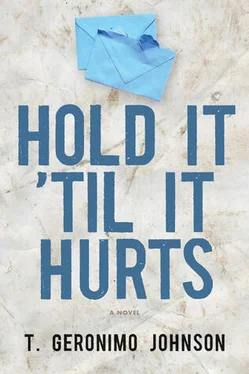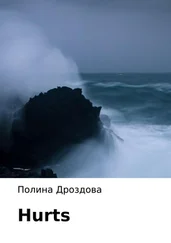“I had that picture added to our program for tomorrow’s service, so everyone will see it tomorrow. After the sermon, I’m going to tell — excuse me — ask the congregation to keep their hearts, eyes, and ears opened. We’re going to pray, to implore the Lord to grant you and your brother a speedy journey home. Let us pray.”
The pastor took Achilles’s hand in his own and bowed his head. His hands were warm and dry, scratchy. His voice dropped, becoming barely audible, “Lord, aid this young man in his quest. Guide him on his journey to find his brother. Shower them both in your divine grace. Restore their faith in your name, as you restored Noah’s. Send them their dove, Lord, the white light of hope to drive out this darkest night. Return his brother, as you returned Joseph. Bless him as you did Jacob. Protect him as you protected Job …”
Achilles listened. Before some missions, Jackson had gathered them into a circle and recited passages from the Bible. While everyone else hung their heads low, Achilles looked at his buddies, heard the sand crawl under their shifting feet, and wondered if they would be holding hands again in twenty-four hours. Wages furrowed his brow like he was really praying. Wexler, always sleepy, hung his head lowest of all. Merriweather, quiet only during those moments, assumed a look of concentration and shook his blockhead gently from side to side, as if listening to music. Sometimes Achilles and Troy made eye contact and struggled to contain their laughter.
Achilles certainly didn’t feel like smiling now. As the pastor spoke, Achilles noticed a mole under his right eye, the shiny pate, that there was no ring on his finger. Save for a small cross, the pastor wore no jewelry at all, which Achilles found surprising. He had expected the flamboyance and dramatic sermonizing so popular on television.
Achilles felt he should say something, that he owed it to Troy to generate positive energy. What emotion should he summon? Was prayer love, submission, or begging? He felt only frustration. He tried again to focus on his brother, and he kept seeing Troy, instead of Jackson, on the side of the road, or Troy, instead of Merriweather, in the hospital bed, the sheet flat where his foot should be and a shoe with a bolt screwed into the heel sitting atop his nightstand. Opening his eyes made no improvement.
The chapel doors were ajar, and he found the color of sunlight through stained glass garish and lurid. The emaciated black Jesus looked gut-shot and glassy-eyed, closer to a corpse than a god. Levreau’s voice had risen not one decibel but now seemed to come from everywhere and nowhere at once, flooding the vestibule in a river of sound. With every mention of an unknown prophet, Achilles grew more uncomfortable, fighting the urge to fidget, certain that the pastor felt in his hands the lack of faith, or would soon look up and see Achilles’s empty eyes.
He pressed his lids together tightly but saw only afterimages of the church. St. Augustine resembled nothing so little as the ostentatious megachurches he’d seen on TV. The vestibule was humble, the exterior wall merely painted cinder block. The wooden bench upon which they sat was worn and weathered, as if it had only recently been brought inside, and the battered and chipped holy water font was made of formed concrete. It too appeared to have been only recently rescued from the elements, the top tarnished with a greenish ring and the base the same dingy gray as the concrete playground pad at his elementary school. The school had had a blue rocking hippopotamus screwed deep into the concrete. He and Troy would take turns sitting on the hippo while the other pulled it back as far as possible, hoping to launch the rider into the sandbox a few feet away. When they weren’t doing that, they were trying to toss each other from the merry-go-round or bounce one another off the seesaw. Back then, when he was eight and Troy only six, he could win at everything and made a point of letting Troy occasionally win. Troy’s handicap steadily decreased, until by ninth grade, he was nearly as tall as some seniors. Troy was tall like their father, but Achilles was short like … who?
A tap on his shoulder brought him back.
The pastor smiled. “Nothing refreshes like prayer.” The kitchen would soon be open, and Levreau offered to let Achilles wait inside, but Achilles declined, preferring to wait across the street at Seaton’s Diner, which was air-conditioned. Levreau again took Achilles’s hands in his own and said, “The Lord protects all who come to him. Remember, sometimes the Lord works behind the scenes.” Achilles murmured his thanks as he inched toward the door. He couldn’t wait to get out of St. Augustine, back under the sun, into the buzz and babble of the street, and away from that hall, where even the acoustics spooked him; away from those high ceilings that he would have expected to swallow even a rifle report but instead made every whisper a cry.
Outside he stood on the corner, on his X, his center of the city. Across the street, two young boys in frayed cut-offs belly-crawled under the houses from one property to the next, pointing their sticks at each other and making shooting sounds. They disappeared into the yawning crawl spaces, reemerged in the narrow strip of dirt between houses, then pressed their backs to the clapboard walls and made a show of dramatically peeking around corners. One of the kids pointed his stick at Achilles. “Bang!” Achilles made a fist and extended his index finger, but he found himself unable to shoot back, his hand hanging listlessly at his side. The kid raised the stick again, this time cocking the would-be rifle butt into his shoulder, taking careful aim, and even recoiling as he said, “Bang!” Achilles raised his hand to his heart. “You got me.” The kid laughed gleefully, catching a mouthful of sunlight, and ran off, bare feet slapping sizzling pavement.
Seaton’s was an old diner with a greasy laminated counter overlooking the grill. Most of the crowd seemed to be regulars. They talked to each other, ignoring Achilles, except for one old man seated at the counter gumming a snow cone. From his perch he had a clear view of Achilles’s window booth, and continually snuck glances at the church program. After twenty minutes of peek-a-boo, the old man slid into the booth across from Achilles. He looked to be nearly sixty. His polished walnut skin hung loosely at his neck, which was partially obscured by a long lower jaw that jutted out like a shelf. Around his eyes, his burnished skin was much darker, a dusky coal the same color as his flat pupils and sparse hair. Deep fissures branched up and across his cheeks, like the roots of an upturned tree. His leather medallion cut in the shape of Africa bounced as he moved. “Where you from?”
Achilles recoiled from the smell of sour beer, leaning as far back as possible.
The man said, “Say ‘New Orleans’ and I’ll tell you.”
“Say New Orleans?”
“It’s Nawlins, son, Nawlins . You ain’t from ’round here. You want to fit in here, say Nawlins . This is the Tremé district — famous.” He pointed across the street at St. Augustine. “That church over there, famous. This diner, famous. Me? Almost famous.” He extended his hand. “I’m Bud.”
Achilles winced inwardly as they shook. “Achilles.”
“I knew an Achilles, pronounced ‘A-sheel,’” he said, gnawing at his snow cone. Red syrup dripped onto the table, cherry from the smell of it.
Achilles pushed his newspaper and the church programs to the side, placing his pencil on top of them.
“You’re the young fellow looking for the young fellow on the wall over there?”
Achilles nodded. “Yes sir. My brother. You’ve seen him?”
“No. I just do a bit of volunteer work at some shelters and get around a bit, so I might. There a reward?”
Читать дальше












